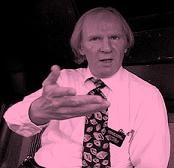The metaphysical motif of the final “Sopranos” season rolled on last night, as a comatose Tony, shot by his Uncle Junior, chose not to “walk into the light,” even as he was driven toward it by Paulie Walnuts’s yammering at his bedside.
As revealed during last week’s episode, Tony’s mind, in his coma, is replaying his life, though this version is far different than what actually happened. In his reverie, Tony, some sort of salesman, is in possession of a briefcase belonging to a Kevin Finnerty. Checking into a hotel, he is asked to present ID, and having no other ID, he uses Finnerty’s. At that point, a group of Buddhist monks accost him, demanding accountability for a bum heating system Finnerty sold their monastery.
Forward to this week’s episode, and Tony finds himself served with papers by the Crystal Monastery. Hoping to uncover the true identity of Kevin Finnerty, he seeks out the monks, who chuckle each time he tells them that he isn’t Finnerty. If you haven’t gotten it by now, Tony’s new name is a thinly veiled reference to the concept of infinity. One of the merry monks explains that, in the end, everything is one, but for now, someone needs to be responsible–for the heating system, in this case. Tony has also been diagnosed with Alzheimer’s and therefore, isn’t sure whether or not he really isn’t Finnerty, so he heads to a Finnerty family reunion in search of more answers.
Upon reaching the Inn at the Oaks, he is greeted by a man he does not recognize, played by Steve Buscemi–who played Tony’s cousin in season five, and whom Tony had to murder. Tony starts walking toward the door, but doesn’t want to relinquish his briefcase. The man tells him that he has to, that his family is waiting for him, and that there’s no business allowed inside. Tony is hesitant to let the man have the case, though he doesn’t seem to know why, until he hears a small voice–Meadow’s voice–calling him back. Tony slowly opens his eyes to see a blurry Meadow and Carmella at his side.
Will Tony be a changed man after his near-death experience? Will he take responsibility for his actions, as the monks have asked? In his coma, did he overhear anything that he shouldn’t have?
The episode raises many questions and is full of just as many afterlife clichés–the Buddhist concepts of consciousness and existence, the idea of heading into the light (Tony keeps seeing a beacon in the distance), and the hope that we are all to be reunited with family at the end. But Tony chooses not to transcend. No matter how tempting the afterlife looks, his family still needs him.


